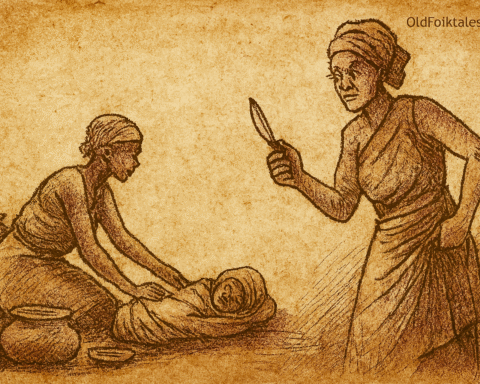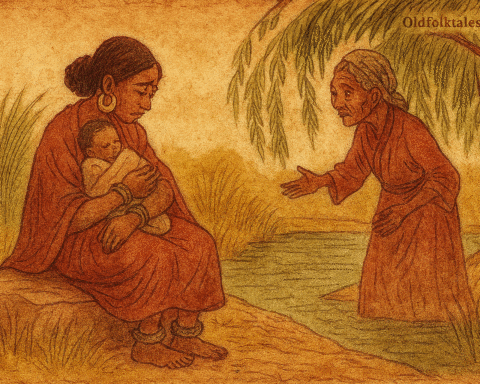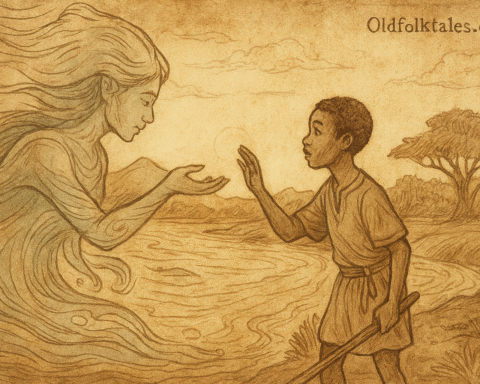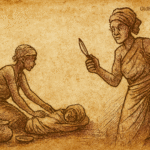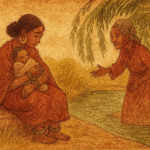Once upon a time, in the heart of Africa where the baobab trees stretched their ancient arms toward endless skies, there lived two friends whose bond was legendary throughout the land. Aleleb-the-Bat and Neneb-the-Sun shared a friendship stronger than ngwalii stone, as inseparable as finger and nail. Their companionship was the talk of every village, for never had creatures so different found such deep connection.
Day after day, the two friends visited one another with joy that filled their hearts like the first rains after drought. Sometimes they would spend peaceful evenings at Bat’s dwelling, sharing stories as shadows lengthened across the earth. Other nights, Bat would journey to Sun’s brilliant compound in the heavens, basking in the warm glow of his friend’s radiant presence. Their friendship knew no boundaries, bridging the gap between earth and sky with pure affection.
One season, Bat made his usual journey to visit Sun, and they spent several blissful days together, laughing and sharing the deep conversations that only true friends can enjoy. The golden light danced around them as they spoke of dreams and memories, their bond growing ever stronger with each passing moment.
Also read: The Animals War with Humans
But when Bat finally returned to his earthly home, his heart was immediately crushed by devastating news. His beloved mother, the woman who had been his anchor through every storm of life, lay gravely ill upon her sleeping mat. The sight of her frail form filled Bat with terror, for he had always seen his mother as the strongest tree, one that could sprout and thrive even from beneath the heaviest rock.
Through tear-filled eyes, Bat watched as his mother’s strength ebbed away like water seeping into thirsty sand. He flew desperately from one healer’s compound to another, his wings carrying him on urgent winds as he pleaded for help. The wise healers examined his mother with gentle hands, giving her potent herbs that filled the air with earthy, bitter scents. They poured sacred libations onto the ground and called upon the ancestors with voices that rose like smoke toward the heavens, begging them to watch over this good woman.
Despite all their efforts, despite the prayers and medicines and loving care, Bat’s mother grew weaker with each sunrise. Her breathing became shallow, her voice barely a whisper carried on the evening breeze.
“My precious son,” she said one twilight evening, her words coming in short, labored gasps, “I can feel that my time has come to leave you and join our ancestors in the spirit world. Do not grieve too heavily when I am gone. You must continue to be dutiful and take good care of yourself.”
Her weathered hand reached up to touch his face with infinite tenderness. “If I have taught you anything in this life, it is this: the rain which beats upon a stone merely washes its surface clean, it cannot break what is truly strong within. You have been the most devoted son any mother could wish for, and I know you will find the strength to continue on this path.”
With these final words of love and wisdom, Bat’s mother closed her eyes and peacefully joined the ancestors, leaving her son with a heart as heavy as the ngwalii stone itself.
Bat’s grief crashed over him like flood waters, but through his tears, he knew exactly what honor demanded. His mother deserved to be buried before darkness threw its shadow over the village, this was the proper way, the respectful way. Surely his dearest friend would understand and help him in this desperate hour.
With hope still flickering in his broken heart, Bat flew swiftly through the afternoon air to find Sun blazing gloriously in the sky above.
“Sun, my closest friend,” Bat called out, his voice thick with sorrow, “my beloved mother has died. Please, I beg of you, hold your light just a little longer. Let your brilliant torch shine so I may bury Mother-of-Mine with the dignity she deserves. After I have laid her to rest properly, you may extinguish your light and rest.”
But Sun’s response fell upon Bat’s ears like stones dropping into still water, creating ripples of shock and disbelief.
“My good friend,” Sun replied with what seemed like casual indifference, “I know you are suffering, but I’m sorry, I cannot wait for you to bury your mother. Why don’t you simply wait until daybreak tomorrow?”
The words hit Bat like a physical blow. His throat grew bitter, more bitter than ghee, as the full weight of his friend’s refusal settled upon his spirit.
“How can you ask such a thing of me?” Bat cried out in anguish. “Death has snapped the shoulder bone at the very spot where life’s burden is carried! What kind of friend abandons another in their darkest hour?”
Without waiting for an answer, Bat flew off into the gathering twilight, his heart breaking with each beat of his wings. The golden light that had once brought him such joy now seemed cold and distant, a false promise of friendship that crumbled when tested.
“No,” the sobbing Bat kept repeating to himself as he flew homeward, “I must bury her today. I must honor her today.”
He arrived at his dwelling just as darkness began to claim the land, working frantically by touch and memory to prepare his mother’s final resting place. In the complete darkness of night, with only the stars as witnesses, Bat tenderly laid his mother to rest in the earth that had nourished her throughout her life.
When his sacred duty was finally complete, Bat lay down beside his mother’s grave under the vast canopy of stars. With tears still wet upon his cheeks, he made a solemn vow that would echo through generations: never again would he look upon Sun’s face. Never again would he trust the light that had failed him when he needed it most.
He buried that once-precious friendship alongside his mother, covering it with the same earth, sealing it away forever.
And that, the storytellers say, is why from that day forward, bats have shunned the face of the sun and move about only under cover of darkness. They carry within their small hearts the memory of a friendship betrayed, a trust broken when compassion was needed most.
Moral Lesson
This folktale teaches us that true friendship is revealed not in times of joy and ease, but in moments of desperate need. When we fail to show compassion to those we claim to love during their darkest hours, we may lose their trust forever. It reminds us that our actions in critical moments define the true nature of our relationships.
Knowledge Check
Q1: What does the ngwalii stone symbolize in this African folktale? A: The ngwalii stone represents strength and permanence. Bat’s friendship with Sun was described as “stronger than ngwalii,” and later his grief became “as heavy as ngwalii stone,” showing how the symbol represents both unbreakable bonds and overwhelming emotional weight.
Q2: Why was it so important for Bat to bury his mother before darkness fell? A: In African cultural tradition, burying the dead before nightfall shows proper respect and honor to the deceased. Bat wanted to follow this sacred custom to demonstrate his love and duty as a devoted son.
Q3: How does Bat’s mother’s final advice reflect African wisdom traditions? A: Her words “the rain which beats on a stone merely washes its body” represent traditional African wisdom about inner strength and resilience, teaching that external hardships cannot break a person’s core character and spirit.
Q4: What role does the concept of friendship play in this folktale’s moral lesson? A: The story contrasts surface-level friendship (good times together) with true friendship (support during crisis). Sun’s refusal to help during Bat’s greatest need reveals that their bond was not as deep as it appeared.
Q5: How does this folktale explain a natural phenomenon through storytelling? A: This etiological tale explains why bats are nocturnal creatures by connecting their behavior to an emotional story about betrayal, showing how African folktales often use relationship dynamics to explain animal behavior.
Q6: What does Sun’s response reveal about the nature of selfish friendship? A: Sun’s suggestion to “wait until daybreak” shows how selfish friends prioritize their own convenience over others’ urgent needs, demonstrating that fair-weather friendships crumble when genuine sacrifice is required.

